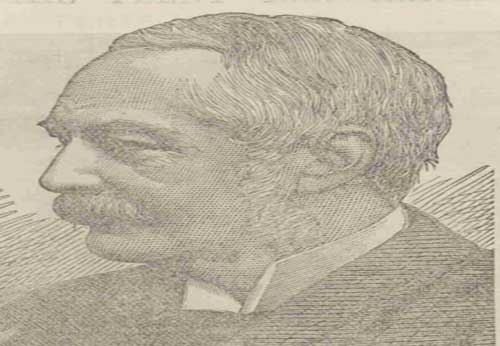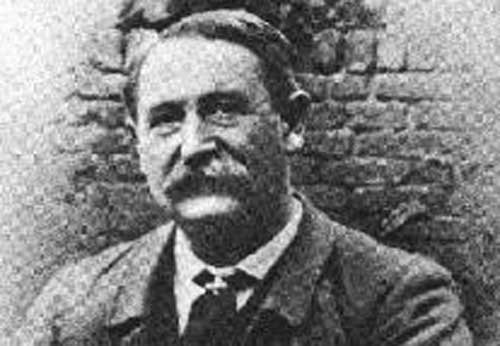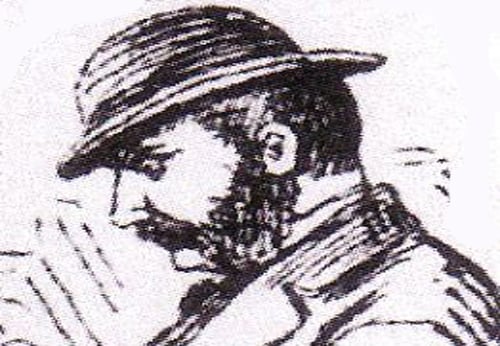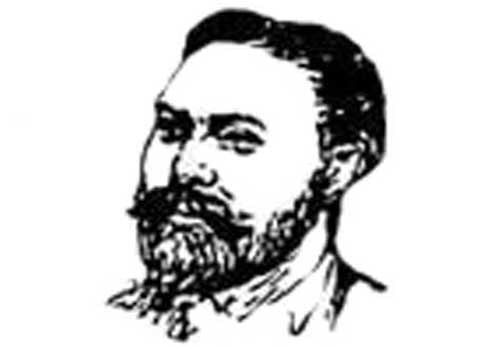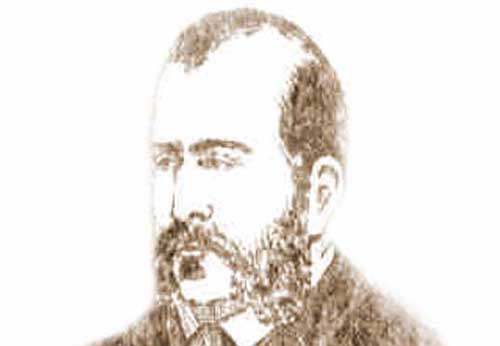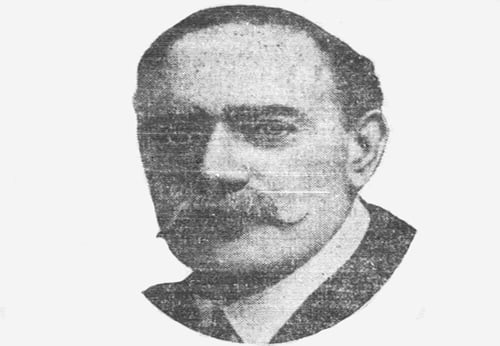- Sergeant William Thick was one of the police officers who hunted Jack the Ripper in the autumn of 1888.
- He was prominent in the "Leather Apron" scare, in that he was the officer who arrested John Pizer.
- A year later, in September, 1889, a letter was sent to the Home Office accusing Sergeant Thick of having carried out the murders.
- This makes him the only police officer who, at the time, was accused of having been Jack the Ripper.
- Site Author and Publisher Richard Jones
- Richard Jones
SERGEANT WILLIAM THICK
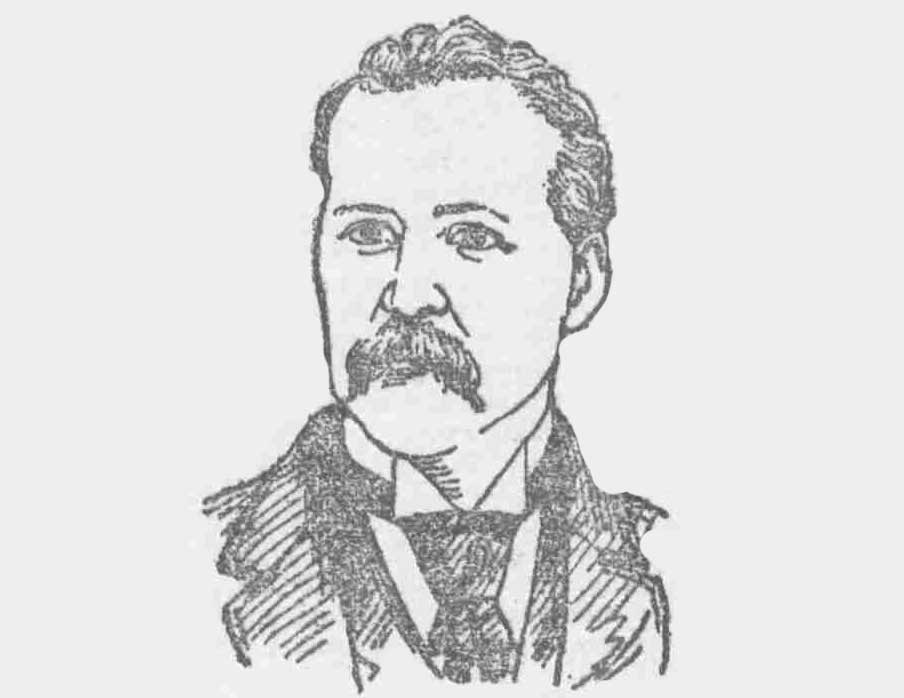
JOHNNY UPRIGHT OF H -DIVISION
Sergeant William Thick - whose name was also spelt as Thicke in many press accounts and police reports on the murders - spent the large part of his police career in the East End of London, working for the Metropolitan Police's H-Division.
William Thick joined the Metropolitan Police on 16th March, 1868, and, despite spells in different divisions of the force, most of his career would be spent working the streets of the East End of London, first as a Police Constable, and then, from 1873, as a Police Sergeant.
He has been described as, "...a stout-built, keen but pleasant-faced man, with a thick, drooping yellowish moustache; and, according to his colleague, Walter Dew, he was "...a holy terror to the local law-breakers."
His nickname for much of his career, and one that appears to have followed him into retirement, was "Johnny Upright", a sobriquet that, according to Walter Dew, had been bestowed upon him because "...he was very upright, both in his walk and in his methods."
According to an article published in the Pall Mall Gazette on 29th October, 1891, Thick was very proud of his nickname:-
This charming sobriquet...is one of which Sergeant Quick [the reporter refers to him as Quick, rather than Thick, in the article] is very justly proud, as it indicates a generous appreciation of the fair and square dealing which has been his motto all through his long years of detective work, and by which he has gained a perfectly unique status in Whitechapel..."
HOW HE BECAME KNOWN AS "JOHNNY UPRIGHT"
According to an article, published in Lloyd's Weekly London Newspaper on Sunday, April 30th, 1893, he had come by his nickname of "Johnny Upright" under the following circumstances:-
It is now some 20 years since Detective Thick first became known by the soubriquet of "Upright John."
A gang of expert thieves were captured by some officers of the H division, but the accused men protested against the construction put on their actions by the officers, declaring that the conclusions drawn were not warranted by the facts.
Into the dispute stepped Detective Thick, whose evidence drew forth the remark from a prisoner that he was the only "upright witness" he had known for many years.
His evidence altered the complexion of the case, and he was invited by the prisoners to tell the court what he knew about them.
Fearlessly Mr. Thick told the jury that the knowledge that the men in the dock were convicted thieves weighed heavily against them when the facts of the case were looked at by the police.
The joy of the prisoners at this statement knew no bounds, whereupon Justice Kerr remarked sotto vocs[translation in a low voice] to one of the sheriffs sitting beside him, "Upright John has pleased them."
This remark was overheard, and henceforth Detective William Thick was known by judges, barristers, his fellow officers, and the criminal classes as "Upright Johnnie."
HIS PART IN THE JACK THE RIPPER INVESTIGATION
As a member of H - Division of the Metropolitan Police, Sergeant William Thick's name turns up frequently in newspaper reports on the Jack the Ripper murders.
His most prominent action was to arrest John Pizer, on 10th September, 1888, the man who, so Thick maintained, was the notorious "Leather Apron."
Recalling his arrest, in an interview that was published in the Yorkshire Post and Leeds Intelligencer, on Thursday, 13th September, 1888, Pizer described his encounter with the detective:-
On Monday morning Sergeant Thick came. I opened the door. He said I was wanted, and I asked, "What for?" He replied, "You know what for: you will have to come with me. I said, "Very well, I will with the greatest of pleasure." The officer said, "You know you are 'Leather Apron."
CLEARED OF THE CHARGES
At the subsequent inquest into the death of Annie Chapman, Pizer was publicly cleared of Annie involvement in the murders, and, afterwards, he was actually escorted home by Sergeant Thick.
Many years later, William Thick would claim that, "he never thought he [Pizer] was guilty of or even capable of committing the crimes..."
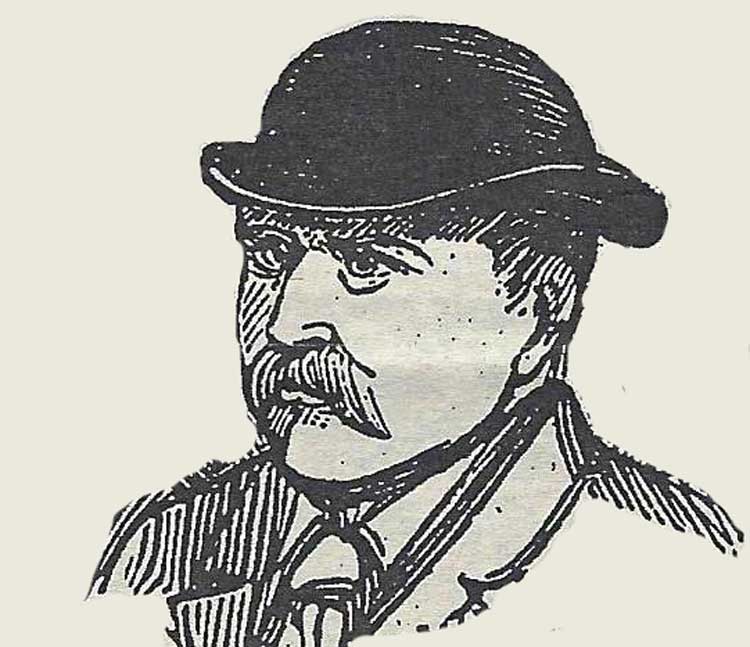
Sergeant William Thick
Source The Illustrated Police News, 22nd, September, 1888.
HIS RETIREMENT FROM THE POLICE
Sergeant William Thick retired from the Metropolitan Police in April 1893 and, on Sunday, April 30th, 1893, Lloyd's Weekly London Newspaper provided its readers with a breakdown of his distinguished career with the force:-
For many years Detective-sergeant Thick, of the H division, who has just retired after completing 25 years' service, has been known by the sobriquet of "Upright John,"
Joining the force in 1868 Mr. Thick soon came under the notice of his superiors, and three years later his conduct of a difficult case drew from Mr. Paget, one of the magistrates at the Thames police-court, such eulogistic remarks that he was at once attached to the Criminal Investigation Department.
He had hardly been in plain clothes a few hours before he succeeded in capturing a thief who, in a most daring manner, and in broad daylight, robbed a sailor of a gold watch and chain in Ratcliff-highway.
Detective Thick has done splendid work, having been commended by judges, juries, and magistrates no lees than 121 times, and has received a very large number of rewards from the Commissioners.
Except for a short interval, the whole of the 25 years Mr. Thick spent in the East-end attached to the H division, and during that time he has had through his hands some 500 prisoners, and has succeeded in tracing and restoring nearly 40,000l, worth of stolen property."
WENT TO WORK FOR THE RAILWAY
William Thick spent the next twenty years working for the London, Tilbury and Southend Railway Company, for which he became the Superintend of their Police force.
A VISIT FROM JACK LONDON
In 1902, American author Jack London (1876 - 1916) paid a visit to the, then retired, Sergeant William Thick, to seek his assistance in finding suitable East End lodgings whilst he was researching his book The People of the Abyss.
Referring to him as "Johnny Upright", London described him thus in the finished book:-
A detective of thirty-odd years' continuous service in the east End, known far and wide by a name given him by a convicted felon in the dock, he was just the man to find me an honest landlady, and make her rest easy concerning the strange comings and goings of which I might be guilty."
JOHNNY UPRIGHT ARRIVES
However, when Jack London arrived, William Thick was, in fact, at church with his family, and so the author had to await his return.
Eventually, the family arrived back from church and Jack London later recounted his meeting with the former detective, in terms which provide a wonderful glimpse of Thick's domestic situation:-
...His two daughters beat him home from church, - and pretty girls they were in their Sunday dresses, withal it was the certain weak and delicate prettiness which characterizes the Cockney lasses, a prettiness which is no more than a promise with no grip on time, and doomed to fade quickly away like the color from a sunset sky.
They looked me over with frank curiosity, as though I were some sort of a strange animal, and then ignored me utterly for the rest of my wait.
Then Johnny Upright himself arrived, and I was summoned upstairs to confer with him.
"Speak loud," he interrupted my opening words. "I've got a bad cold, and I can't hear well."
Shades of Old Sleuth and Sherlock Holmes! I wondered as to where the assistant was located whose duty it was to take down whatever information I might loudly vouchsafe. And to this day, much as I have seen of Johnny Upright and much as I have puzzled over the incident, I have never been quite able to make up my mind as to whether or not he had a cold, or had an assistant planted in the other room.
But of one thing I am sure; though I gave Johnny Upright the facts concerning myself and project, he withheld judgment till next day, when I dodged into his street conventionally garbed and in a hansom. Then his greeting was cordial enough, and I went down into the dining room to join the family at tea.
"We are humble here," he said, "not given to the flesh, and you must take us for what we are, in our humble way."
The girls were flushed and embarrassed at greeting me, while he did not make it any the easier for them.
"Ha! ha!," he roared heartily, slapping the table with his open hand till the dishes rang. "The girls thought yesterday you had come to ask for a piece of bread! Ha! ha! ho! ho! ho!"
This they indignantly denied, with snapping eyes and guilty red cheeks, as though it were an essential of true refinement to be able to discern under his rags a man who had no need to go ragged.
And then, while I ate bread and marmalade, proceeded a play at cross purposes, the daughters deeming it an insult to me that I should have been mistaken for a beggar, and the father considering it as the highest compliment to my cleverness to succeed in being so mistaken.
All of which I enjoyed, and the bread, the marmalade, and the tea, till the time came for Johnny Upright to find me a lodging, which he did, not half a dozen doors away, on his own respectable and opulent street, in a house as like to his own as a pea to its mate..."
A FARWELL DINNER
Thick retired from the Railway in 1914 and a farewell dinner was given in his honour.
Interestingly, his involvement with the Jack the Ripper case was mentioned in the speeches.
The East London Observer provided a full account of the dinner and the speeches in its edition of Saturday, April 4th 1914:-
On Saturday evening loot, at the Castle Hotel, Commercial Road, a dinner was given in honour of the retirement, through age limit, of Mr. William Thick (popularly known as Johnny Upright), Superintendent of Police of the London, Tilbury and Southend Railway Company, and was attended by all the officers of the Police staff at the Commercial-road depot, who met on this occasion to bid farewell to their Chief and other officers, as it was the final meeting of these men, who, though only a small force, are now compelled to disband as a result of the London, Tilbury and Southend Railway Company being acquired by the Midland Company.
This latter company have decided to bring their own policemen to take the place of those, who have so faithfully served for so many years and with such results that cannot possibly be beaten as regards protection of property and the detection of crime.
At the same time the Midland Company have not been harsh; the men who were eligible were offered other positions at equal wages, and those who preferred to retire were offered a compensation bonus of £50 each.
Superintendent D. E. Munns, of Commercial-road depot, honoured the occasion by his presence, and after the dinner, which was well served, the toast of "The King" was given and duly honoured.
Mr. Munns then congratulated Mr. Thick on his good services, and expressed regret at losing such a man, who had so well conducted the Company's Police Force, both in the interests of the London, Tilbury and Southend Railway and to the entire satisfaction of all the men under him. (Cheers.)
Mr. William Thick then replied, saying that he was well satisfied with the way duties had been performed by all the staff under him, and regretted having to resign his position, as he felt well able to carry on his arduous duties for several years longer.
Mr. Thick's record while a member of the C.I.D. Metropolitan Police was mentioned, and goes to show what a worker he has always been, viz., 25 years in the Metropolitan Police and over 20 years as Chief of the Railway Police, and now ready to do more.
Mr. Thick was engaged for many years with the H Division and took an active part during the "Ripper" scares.
...At the close Mr. Wm. Henry. of the N.U.R, mentioned, on behalf of all the workers, how sorry they were to lose Mr. Thick from the service, and wished him long life and happiness in his retirement."
OLD EAST LONDON POLICEMAN
Two weeks later, in its edition of Saturday, April 18th, 1914, the East London Observer provided its readers with an account of William Thick's police career.
Mr. William Thick, whose retirement on account of age limit from the Tilbury Police we announced last week, has had some interesting experiences in his long official career.
He is, however, still too active a man to retire from work altogether, and he proposes to take up service as a private detective.
Sixty-five years of age, Mr. Thick spent twenty-five years with the Metropolitan Police and some twenty years with the Tilbury Police.
Altogether he has had forty-five years in the East End.
At the time of the Ripper murders, he was a first-class detective-sergeant, and he was kept busy at that sensational period.
He went through the whole of the Ripper era, and now he says:- "There in no more knowledge to-day as to who committed the crimes than there was then. We never knew anything and could never fix anyone directly with the murders. They were and are a mystery.-
The excitement and alarm created by the fiendish culprit were tremendous, and many innocent people were arrested, including the present Editor of the "East London Observer," who was out in search of "copy."
All sorts of people were taken in charge, and anyone carrying a handbag or loitering about was immediately suspected.
A notorious character in Whitechapel at the time was a boot-clicker known as "Leather Apron," who was one of the people arrested on suspicion, and discharged. He obtained his soubriquet from the fact he was never seen without his Apron. His habits and eccentricities drew towards him a great deal of suspicion, and certain newspapers even pointed to him openly as the murderer. But, for this indiscretion, they had to pay him compensation.
Mr. Thick had the distinction of arresting "Leather Apron.", although he never thought he was guilty of or even capable of committing the crimes.
But, when someone said to Mr. Thick, "I will give you £50 if you will put me on to 'Leather Apron,' he fancied he might be worth more to himself.
Knowing the whereabouts and habits of this character, Mr. Thick at once went to a house in Mulberry Street, where "Leather Apron" lived with his mother.
The postman's knock resulted in the door being readily opened, and by the suspect himself.
"They've got me," he shouted, on seeing the officer.
A search was then made of the sharp instruments with which the clicker plied his trade, and when these were produced it was thought that rust marks were bloodstains.
There was a sense of great excitement as the suspect was taken to Leman-street Police Station.
The feeling against, the real murderer was tremendous, and this case had been fostered by the Press.
If the public had got hold of "Leather Apron" it is just possible that he might have been assassinated, innocent though he was.
After being detained a short while, however, he was discharged, like so many others; and the great mystery remained unsolved, although various people have theories on the subject."
...Now. in spite of all his exertions and his years, Mr. Thick is as hale and vigorous as ever; he is popularly known as "Johnny Upright."
HIS LAST YEARS
William Thick enjoyed a long retirement.
Following the death of his wife, Hannah, he moved to Northcote Road, South London, where he resided with his daughter Alice.
He died on Sunday, 7th December, 1930.
Article Sources
Register of Leavers From The Metropolitan Police. Ref: MEPO 4/340/27
Lloyd's Weekly London Newspaper, Sunday, 30th April, 1893.
East London Observer, Saturday, 4th April, 1914.
East London Observer, Saturday, 18th April, 1914.
Jack London. People of the Abyss. The Macmillan Company (1903).


